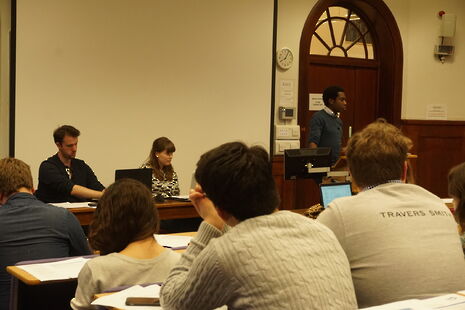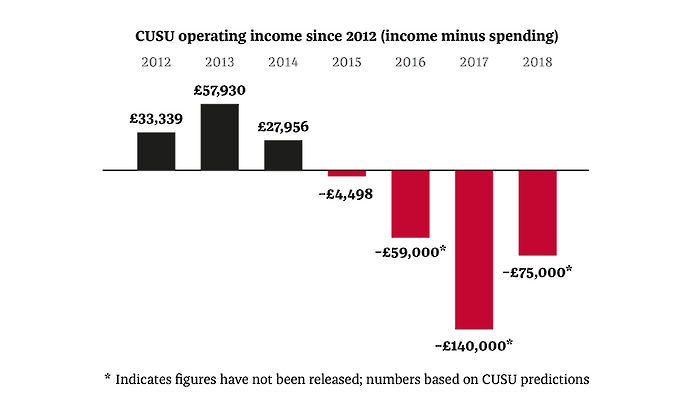CUSU reveals £200,000 losses from publication contract ‘slippage’ over last two years
JCR Presidents and External Officers challenge President over future spending as huge deficit is predicted, with no expectation that the money can be recollected

CUSU revealed it has lost nearly £200,000 after contract issues with a publisher, following a question by Varsity at CUSU Council.
CUSU General Manager Mark McCormack said that CUSU’s auditors would be “filing a £59,000 loss” for 2015-16, with losses “in the area of £140,000” expected from 2016/17.
The student union claims it has been attempting to leave its contract with St James’ House (SJH), a publisher. CUSU President Amatey Doku said that SJH had been slow to deliver on multiple publications, resulting in a huge loss in anticipated income.
A draft budget for 2017/18, released last night, showed that CUSU was expecting to run a £75,000 deficit over the next year, largely as a result of publishing contract issues. In June 2015, CUSU was forced to request a bailout from the University after the detaching itself from one of its careers publications, the CUSU Guide to Excellence, which was published in partnership with SJH.
Asked by Varsity about the gap between the reserves which were listed in 2015, £341,339, and those in the draft budget for the start of the next financial year, £164,443, McCormack admitted that when the completed accounts for 2015–16 and 2016–17 were released, they would include huge losses.
Combined, the collated losses could place the total irrecoverable losses CUSU faces as high as £400,000 since 2014. Doku said CUSU does not know whether new publications are even in the production pipeline, and offered no guarantees that the money could be recovered.
Careers publication have previously been a cornerstone of CUSU’s financial activities, and were historically one of its largest revenue streams. Pressed on whether CUSU could ever expect to recover the money lost, Doku said that he did not expect it to. He said that CUSU would attempt to diversify its revenue streams in “trying to avoid being so reliant on a single source of income”.
The Council follows CUSU’s release, late last night, of a provisional budget for 2017/18. The student union has predicted losses of £75,000 in the next year as it renegotiates its business relationship with a publishing house with whom it has often worked. The proposed budget will mean heavily hitting CUSU’s financial reserves, and raising the possibility it will need to request a bailout from the University.
Speaking to Varsity earlier today, Doku defended the deficit budget, saying that that it represented “the first time in a long time that [CUSU] has been able to think really clearly about the short-term and the long-term”.
The draft budget is heavily simplified, containing far more basic information than the budgets which were drafted and eventually ratified in Easter term last year. Doku said he expects the full budget to be released by Thursday.
Doku proposed a nine-point plan to improve the student union’s finances, including increased affiliation fees, and a cut to the Council’s free budget, which it can use to fund motions.
Affiliation fees have been frozen since 2010, which Doku said meant CUSU had taken a “£20–35k cut”. He said “in the financial times we live in, it wouldn’t make sense not to put that on the table”. He proposed placing a 1 per inflation rate on fees.
Darwin student president, Elaine Gray, said she believed her students would be willing to accept an increase. But Emmanuel JCR President Connor MacDonald, and St John’s Academic Affairs and Careers Officer Simon Percelay said that they would both anticipate potential problems with college governance over an affiliation fee increase, and asked how potential conflicts could be avoided.
Doku outlined CUSU’s broad financial situation to attendees, saying he would show “all the numbers” ahead of Easter’s next Council session. He emphasised the key importance of publications to CUSU’s financing.
Doku said that CUSU’s relationship with the publishers was not working, and that the Trustees of the student union had been attempting to renegotiate their relationship with SJH, but had been unsuccessful at the time of the budget being set. He said that CUSU were now exploring new options, including forming a publishing relationship with the University itself, and said that this would be the start of a three-year strategy.
MacDonald pressed Doku on whether CUSU is likely to receive a lump sum back from SJH at some point.
McCormack answered, saying “The contract came to an end, and [CUSU is] in the process of negotiating a new contract”.
Doku described “slippages” within the publishing process, in which SJH delayed the publication of careers guides, as triggering knock-on issues. Education Officer Roberta Huldisch said that the new budget showed CUSU is “trying to deal” with residual issues.
Wolfson College’s External Officer, Sebastian Wrobel, pressed Doku on a wider loss of income, asking if CUSU’s income had dropped from areas other than external publications.
McCormack said he would have to “look into” Wrobel’s question, but suggested that a change in the valuation of CUSU’s premises had resulted in a loss of funds.
Homerton JCR President William Hewstone asked whether CUSU intended to make any major cuts to its areas of operation at this stage. Doku said that no large-scale options were on the table at the moment.
Selwyn JCR President Ted Mackey asked Doku about proposals for CUSU to move away from using an NUS-hosted website. Doku said that some of the website’s potential functionality was not being used, and suggested there could be a consultation process on how to improve it. He proposed a more “basic” website as a potential solution, but said “in the short term, it may not be cheaper”
 News / Judge Business School advisor resigns over Epstein and Andrew links18 February 2026
News / Judge Business School advisor resigns over Epstein and Andrew links18 February 2026 News / Hundreds of Cambridge academics demand vote on fate of vet course20 February 2026
News / Hundreds of Cambridge academics demand vote on fate of vet course20 February 2026 News / Gov grants £36m to Cambridge supercomputer17 February 2026
News / Gov grants £36m to Cambridge supercomputer17 February 2026 News / CUCA members attend Reform rally in London20 February 2026
News / CUCA members attend Reform rally in London20 February 2026 News / Petition demands University reverse decision on vegan menu20 February 2026
News / Petition demands University reverse decision on vegan menu20 February 2026











